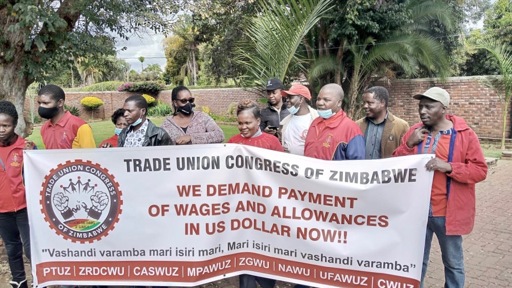Members of the United Food and Allied Workers Union of Zimbabwe (UFAWUZ) staged a picket at Nestlé Zimbabwe, demanding an end to unfair labor practices, restoration of decent wages, job security, and respect for workers’ rights.
According to UFAWUZ Secretary General Ady Mutero, the union was compelled to organize the picket after Nestlé, despite being chair of the Employers Association in the Food and Processing Industry, refused to grant any wage increase following a deadlock at the National Employment Council (NEC). Instead of championing fair wage discussions or proceeding to arbitration, Nestlé “obstructed both processes,” Mutero explained. This left workers without a wage agreement for the June–December period, effectively freezing them on poverty-level salaries. Under Section 74(6) of the Labour Act, workers are legally permitted to picket under such circumstances, leading to yesterday’s action.
Unfair labor practices inside the factory
Mutero calls out a series of unfair labor practices that workers have faced inside the factory. These include:
Refusal to award any wage increases, even after formal requests from both the Workers’ Committee and the union.Violation of Nestlé’s own global Employer Relations Policy, which obligates all subsidiaries to align wages with each country’s Poverty Datum Line (PDL).Use of labor brokers to hire workers on hourly rates below those agreed at the NEC, undermining sector standards.Intentional wage suppression, even as senior management receives hefty salaries and corporate perks.
“These actions undermine both workers’ rights and Nestlé’s internationally accepted employment values,” Mutero noted, saying that the company’s local behavior sharply contradicts its global commitments to decent work.
Longstanding grievances, exhausted dialogue
The union’s grievances are not new, they have persisted throughout this year’s wage negotiation cycle, especially after the NEC wage talks collapsed earlier. Before calling for industrial action, UFAWUZ took several steps:
Participated in NEC wage negotiations for the sector.Formally requested an internal wage adjustment, which the Labour Act allows even when NEC processes are stalled.Urged Nestlé to respect its own global policy by ensuring wages align with the national PDL.Pursued social dialogue, calling on Nestlé to lead by example as the sector’s most powerful employer.
“All these good-faith efforts were rejected,” Mutero said. “Industrial action became the last resort.”
Wages far below the poverty datum line
The wage crisis at Nestlé Zimbabwe is severe. The lowest-paid workers currently earn USD 250 per month, while the national PDL for a family of four stands at USD 650. This means Nestlé pays less than 40% of the living wage required, leaving workers USD 400 short every month.
Mutero highlighted the disparity: workers in the detergents sector, performing equivalent grades, earn USD 400, demonstrating that Nestlé is lagging far behind comparable industries despite commanding a strong global brand and significant local market share.
Inflation and the crisis of survival
Zimbabwe’s persistent inflation and soaring cost of living have eroded workers’ purchasing power to the point of survival crisis. At USD 250, workers cannot meet basic expenses, including food, transport, healthcare, or school fees. Families are forced into debt, informal side hustles, and other coping strategies that remain unsustainable.
Read More: Zimbabwe’s nurses are “living in abject poverty, unable to afford basic necessities”
“For employees of a multinational like Nestlé, the contradiction between corporate profits and workers’ daily struggles is stark and unjustifiable,” Mutero stressed.
A wider fight against exploitation
Mutero placed the workers’ struggle within a much broader African context. According to him, Nestlé’s actions reflect a pattern in which multinational corporations operating in Africa maximize profits while refusing to pay living wages.
“From Zimbabwe to the rest of the continent, neoliberal practices, outsourcing through labor brokers, wage suppression, and ignoring corporate social responsibility, have become entrenched,” he said. UFAWUZ therefore views the Nestlé picket as part of a wider continental resistance against exploitative corporate behavior.
By standing firm, the union hopes to push African governments, employers, and multinational corporations to uphold fair labor standards, respect workers’ rights, and ensure that economic growth benefits the very workers who create the wealth.
The post UFAWUZ pickets Nestlé Zimbabwe demanding the company pay workers a living wage appeared first on Peoples Dispatch.
From Peoples Dispatch via this RSS feed


